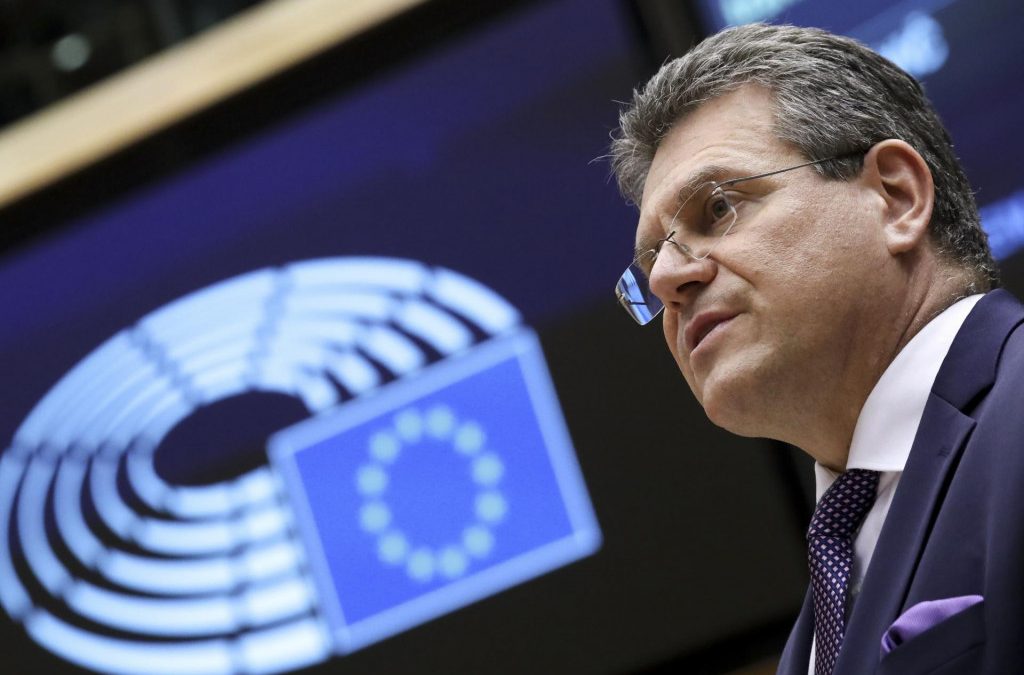Brussels – The EU is trying to build a balanced global trade policy while protecting its interests. This was stated by Maroš Šefčovič, European Commissioner for Trade and Economic Security, during a Wednesday (29/1) meeting with Members of the European Parliament’s International Trade Committee (INTA). This is reported by the TASR correspondent.
Šefčovič explained the situation around trade relations with the United States, a strategic ally of the EU, to the Members. He reminded that no other economies are as integrated as the EU and the USA, which have the largest bilateral trade relationship in the world. He added that both sides are interested in protecting and developing this relationship.
In 2023, trade flows between the two sides reached 1.5 trillion euros, with goods and services worth more than four billion euros crossing the Atlantic daily. In terms of investments, the EU and the USA have invested more than five trillion euros in their economies.
“In this context, we will address trade issues with the new American administration,” said Šefčovič. According to him, the EU wants to act as a strong partner, ready to cooperate with the USA and discuss common interests.
He added that positive transatlantic trade cooperation should reflect the openness to agree on steps to increase bilateral trade and investment. An interesting commercial area is certainly the purchases of liquefied natural gas (LNG). According to him, it is necessary to deepen cooperation between the EU and the USA in the field of economic security, which means jointly addressing challenges arising from China’s non-market policies.
President Donald Trump signed a wide range of executive orders and memoranda, according to Šefčovič, two of them have an impact on trade relations between the EU and the USA. These are the “America First” trade policy memorandum and the executive order on the global OECD agreement to introduce a minimum tax rate.
Šefčovič indicated that the EU is closely monitoring developments in the USA, yet continues with “contingency scenarios” and continues to pursue its trade policy goals worldwide, especially by strengthening trade ties with other countries. These include trade agreements concluded with the Mercosur countries and Mexico and progress made in negotiations with Malaysia from the ASEAN group, in which the Union is already conducting negotiations with Indonesia, the Philippines, and Thailand. He also recalled his recent meeting with the Indian Minister of Commerce and the ambitions of the Eurobloc to build a broader strategic partnership with India.
Regarding relations with China, Šefčovič clarified that it is the third largest trading partner of the EU and also the most demanding. He added that the Union must balance this relationship and ensure more transparency, predictability, and reciprocity.
“This means responding more effectively to China’s structural imbalances and unfair practices, such as non-market policies leading to overcapacity. We need a level playing field,” he explained to the INTA members. He emphasized that by introducing the regulation on foreign subsidies, imposing final duties on imports of battery electric vehicles from China, and other steps, the EU has demonstrated its ability to defend its interests.
Šefčovič mentioned the need to expand trade and investment ties with China, but also to eliminate the EU’s strategic dependencies to be less vulnerable. (January 30)
“This means responding more effectively to China’s structural imbalances and unfair practices, such as non-market policies leading to overcapacity. We need a level playing field.” Maroš Šefčovič
 go to the original language article
go to the original language article
